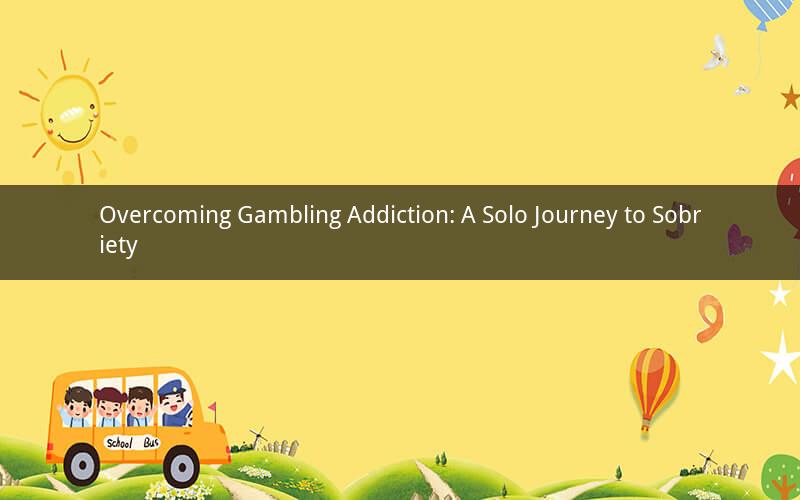
1. Introduction
Gambling addiction is a complex issue that affects millions of people worldwide. It can take a toll on one's financial stability, relationships, and overall well-being. If you're struggling with gambling addiction and seeking a path to recovery, this article will guide you through how to beat gambling addiction on your own.
2. Understanding the Problem
Before tackling the addiction, it's crucial to have a clear understanding of what gambling addiction is. Gambling addiction is characterized by an uncontrollable urge to gamble, despite negative consequences. This urge can lead to financial ruin, relationship breakdowns, and mental health issues.
2.1 Types of Gambling
Gambling can take various forms, including:
- Traditional casino games
- Online gambling
- Sports betting
- Lottery
- Poker
2.2 Signs of Gambling Addiction
Identifying the signs of gambling addiction is the first step towards overcoming it. Some common signs include:
- Preoccupied with gambling thoughts
- Needing to bet more money to achieve the same thrill
- Lying to hide gambling habits
- Ignoring responsibilities due to gambling
- Feelings of guilt, shame, or despair
3. Building Self-Awareness
Overcoming gambling addiction begins with building self-awareness. It's essential to recognize the triggers that lead to gambling and develop strategies to cope with them.
3.1 Identifying Triggers
Triggers can be external, such as social gatherings, or internal, such as boredom or stress. By identifying your triggers, you can create a plan to avoid them or manage them effectively.
3.2 Building Coping Skills
Developing healthy coping skills is crucial in overcoming gambling addiction. Some coping skills include:
- Exercise
- Meditation
- Mindfulness
- Creative outlets
- Social support
4. Setting Goals
Setting clear, achievable goals is a significant step in overcoming gambling addiction. Goals can help you stay focused and motivated throughout the recovery process.
4.1 Short-term Goals
Short-term goals can include:
- Stopping gambling for a specific period
- Reducing the amount of money spent on gambling
- Seeking professional help
4.2 Long-term Goals
Long-term goals can include:
- Maintaining sobriety from gambling
- Building healthy relationships
- Improving financial stability
5. Developing a Support System
While overcoming gambling addiction on your own is possible, having a strong support system can significantly increase your chances of success.
5.1 Family and Friends
Family and friends can provide emotional support and hold you accountable. Encourage them to learn about gambling addiction and how they can help you during your recovery journey.
5.2 Support Groups
Support groups, such as Gamblers Anonymous, offer a platform to share experiences, gain insights, and receive guidance from others who have overcome gambling addiction.
5.3 Professional Help
Seeking help from a therapist or counselor specializing in gambling addiction can provide personalized strategies and support throughout your recovery process.
6. Navigating Relapse
Relapse is a common challenge in overcoming gambling addiction. It's important to understand that relapse is not a failure but a sign that you need to reassess your approach.
6.1 Recognizing Relapse
Identifying the signs of relapse, such as returning to gambling, feeling overwhelmed, or struggling with coping skills, is crucial. If you recognize a relapse, take immediate action to address it.
6.2 Coping with Relapse
When faced with a relapse, it's essential to:
- Acknowledge the relapse
- Analyze the triggers and circumstances that led to it
- Seek support from your support system
- Adjust your recovery plan as needed
7. Celebrating Progress
Overcoming gambling addiction is a journey, and celebrating progress is vital to maintain motivation and focus.
7.1 Recognizing Milestones
Recognize and celebrate milestones, such as:
- Stopping gambling for a certain period
- Maintaining sobriety
- Improving relationships and financial stability
7.2 Maintaining Sobriety
Once you have achieved a significant milestone, continue working on maintaining sobriety by:
- Staying connected with your support system
- Developing healthy habits
- Seeking professional help when needed
8. Conclusion
Overcoming gambling addiction on your own is a challenging yet achievable task. By understanding the problem, building self-awareness, setting goals, developing a support system, navigating relapse, and celebrating progress, you can take control of your life and embark on a journey towards sobriety.
Questions and Answers:
1. Q: What are some effective coping skills for dealing with gambling addiction triggers?
A: Effective coping skills include exercise, meditation, mindfulness, creative outlets, and social support. These activities help manage stress, boredom, and other triggers that may lead to gambling.
2. Q: How can I maintain my sobriety once I have achieved a significant milestone in my recovery journey?
A: To maintain sobriety, continue staying connected with your support system, develop healthy habits, and seek professional help when needed. Celebrate milestones and recognize the importance of your progress.
3. Q: Is it possible to overcome gambling addiction without seeking professional help?
A: While it's possible to overcome gambling addiction on your own, seeking professional help can significantly increase your chances of success. Therapists and counselors can provide personalized strategies and support tailored to your needs.
4. Q: What should I do if I experience a relapse in my recovery journey?
A: If you experience a relapse, acknowledge it, analyze the triggers and circumstances that led to it, seek support from your support system, and adjust your recovery plan as needed. Relapse is not a failure, but an opportunity to learn and grow.
5. Q: How can I encourage my loved ones to understand and support my gambling addiction recovery?
A: Encourage your loved ones to learn about gambling addiction and its impact on your life. Share your feelings and experiences with them, and ask for their support in your recovery journey. Consider attending support group meetings together to foster understanding and support.